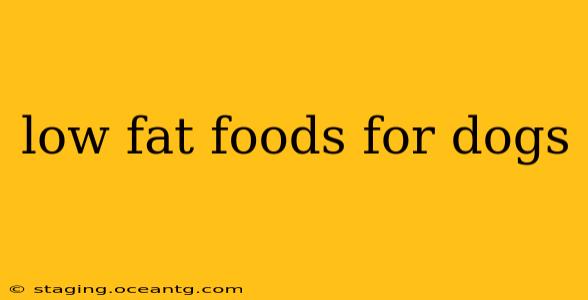Maintaining a healthy weight is crucial for your canine companion's overall well-being. For dogs prone to pancreatitis, obesity, or other conditions requiring a low-fat diet, choosing the right food is paramount. This guide explores safe and nutritious low-fat options for your furry friend, addressing common concerns and offering expert advice. Remember to always consult your veterinarian before making significant changes to your dog's diet, especially if they have pre-existing health issues.
What are the Benefits of a Low-Fat Diet for Dogs?
A low-fat diet can offer several benefits, depending on your dog's specific needs. These include:
- Weight Management: Reducing fat intake helps dogs lose or maintain a healthy weight, reducing the risk of obesity-related diseases like diabetes and joint problems.
- Pancreatitis Management: For dogs with pancreatitis (inflammation of the pancreas), a low-fat diet is crucial to reduce the burden on the inflamed organ.
- Improved Digestion: Some dogs experience digestive upset from high-fat foods. A low-fat diet can alleviate symptoms like diarrhea and vomiting.
- Heart Health: In some cases, a low-fat diet can support heart health, particularly in dogs with certain cardiac conditions.
What Foods are Low in Fat for Dogs?
Many common ingredients can form the basis of a low-fat diet for dogs. Here are some excellent options:
- Lean Meats: Chicken breast (skinless), turkey breast (skinless), lean beef, and venison are all excellent sources of protein with low fat content. Ensure all meat is cooked thoroughly.
- Fish: Certain fish like cod, salmon (skin removed), and flounder provide essential fatty acids (but in moderation due to overall fat content; choose carefully and consult your vet). Always remove bones before feeding.
- Eggs: Cooked eggs (scrambled or boiled) are a great source of protein and essential nutrients.
- Vegetables: Most vegetables are naturally low in fat and rich in fiber, offering excellent dietary support. Good choices include green beans, carrots, broccoli, and sweet potatoes (cooked and in moderation).
- Fruits: Apples (without the core and seeds), blueberries, and bananas (in moderation) can be healthy treats in small quantities.
- Low-Fat Yogurt (Plain, Unsweetened): Plain, unsweetened yogurt can be a healthy addition, but always check the label for added sugars and fat content.
What Human Foods Should I Avoid Giving My Dog?
Many human foods are unhealthy or even toxic for dogs. It's crucial to avoid:
- Fatty Meats: Avoid fatty cuts of meat like bacon, sausage, and ribs. These can trigger pancreatitis.
- Dairy (except plain yogurt as noted above): While some dogs can tolerate small amounts of dairy, many are lactose intolerant and may experience digestive issues.
- Chocolate: Chocolate is toxic to dogs.
- Grapes and Raisins: These can cause kidney failure in dogs.
- Onions and Garlic: These can damage red blood cells.
- Avocado: Avocados contain persin, which can be toxic to dogs.
- Xylitol (artificial sweetener): This is extremely toxic to dogs.
How Much Fat Should My Dog Eat?
The appropriate fat intake for your dog depends on several factors, including their breed, age, activity level, and health condition. Your veterinarian can determine the ideal fat percentage for your dog's diet and provide tailored recommendations. Don't attempt to calculate this yourself; professional guidance is essential.
Can I Feed My Dog Commercial Low-Fat Dog Food?
Yes, many commercial dog food brands offer low-fat options specifically formulated for dogs with weight management or pancreatitis concerns. Look for foods labeled "low-fat" or "weight management" and check the ingredient list for a low fat percentage. Again, your vet's recommendation is crucial to ensure you choose the best option for your dog.
What if My Dog is Suddenly Losing Weight and Seems to Need a Low-Fat Diet?
Unexpected weight loss can indicate various underlying health problems. Do not attempt to treat this yourself. Schedule an immediate appointment with your veterinarian to determine the cause and receive proper guidance on dietary adjustments.
What are some common mistakes people make when feeding their dogs a low-fat diet?
A common mistake is abruptly switching to a low-fat diet without veterinary consultation. This can cause digestive upset. Another mistake is compensating for reduced fat by increasing carbohydrates, which can lead to weight gain. Always consult your vet and follow their dietary plan precisely.
This information is for general knowledge and does not constitute veterinary advice. Always consult your veterinarian before making significant changes to your dog's diet to ensure you're providing the best possible care for your furry friend.
